

Seattle Cosmic met again on Saturday. We had one of the largest turnouts in some time, a total of eleven people: Marty and Ron Hale-Evans (me), newish guy Tim Schutz, Dave Adams, Kathy Kizer, Chad McDaniel, Paul Unwin, Kam Yee, Meredith Wilson, Mark Purtill, and Lesley Hooker (who made a brief appearance but only spectated).
It was a Cosmic Night, so Cosmic Encounter was first on the agenda. People were late in getting to game night (which starts at 7:00), so some of us sat around and chatted at Table 1 while others played a word game at Table 2 (see below). Finally, around 7:50, with four people present (Chad, Mark, Tim Schutz, and I), we decided to start setup for Cosmic. Dave Adams and (unexpectedly) Kathy Kizer showed up shortly thereafter, so we had a full six players for CE:
Dave .... Schizoid-Krypton Mark .... Sorceror-Grudge Ron ..... Mystic-Silencer Chad .... Timelord-Parasite Tim ..... Cavalry-Ghost Kathy ... Gorgon-Usurper
Dave had perhaps the most unusual set of powers. As Krypton (an Internet power), he could use Wild Flares as Supers. As Schizoid, he could set the victory conditions to be other than five external bases (the usual condition). I will borrow the Last Son of Krypton's X-Ray Vision and inform you that the win condition Dave jotted down ran as follows:
You win if you have External Bases equal to 3x # of Internal Bases (minimum of 1).
In other words, if you had two bases in your own system, you needed exactly six foreign bases to win. This win condition proved to be somewhat troublesome for Dave, as we shall see. In fact, most of the players were somewhat off their game that night. In a game with Schizoid, the current player is allowed to ask one yes-or-no question of the Schizoid about his win conditions, per challenge -- yet we didn't get around to asking Dave any questions until Tim's turn. Since Tim was the fifth player and Dave was the first, we missed several chances to worm information out of Dave. And again, I didn't use Silencer much. In part, I didn't want to be too obnoxious, but there were times when I absolutely kicked myself for not having used it, such as Dave's first challenge, when he and Mark both played Compromises and made a base-for-base deal. (Fortunately for me and my shins, Kathy played a Breach Edict and nullified the deal, sending Dave and Mark to the Warp.)
One of the weird things about having Schizoid in the game is that players can often obtain five or more external bases without winning. By Kathy's first turn (she was the sixth player), I already had five bases. I was fairly sure it wouldn't help me win, but I enjoyed the novelty so much I resolved to get as many bases as possible. (Most of the other players apparently reasoned the same way, which was why they didn't hinder me or care to obtain that many bases themselves.)
By this point in the game, we were asking Dave yes/no questions (almost) every challenge. Consulting the group on the best way to phrase his question, Chad asked, "First, do we assume he's rational?" Good question, Chad. It turned out Dave had miscalculated; instead of losing enough home bases to make three times that many foreign bases a feasible goal, Dave now had more home bases than almost anyone except me. (I had played a Rebirth edict when I lost a base and still had five home bases -- something Dave was glad to see, because it meant I had to get 15 foreign bases to win, a near impossibility.)
However, unbeknownst to anyone but me (as Mystic I could see all Flares and Edicts drawn by the other players), Dave had the Super Schizoid Flare, which allowed him to rewrite the Schizoid victory conditions at the end of every challenge. He was about to play Super Schizoid and win on his second turn when Mark Cosmic Zapped the Schizoid, meaning victory conditions were once again five external bases. The only people with five were me and Mark. Tim Un-Zapped Mark's Cosmic Zap, and I Un-Zapped Tim's Un-Zap. Thus, Mark and I shared a win, with five external bases each. Here's a picture of Mark with his prize, a package of Wikki Stix (a construction toy made of stiffly-waxed string):
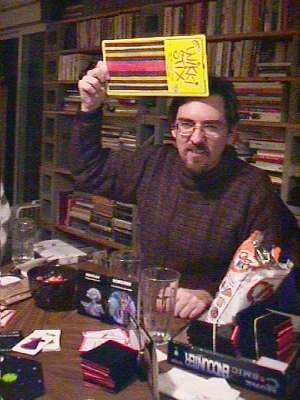
I objected that Dave might have won by playing the Super Schizoid as Krypton, even though he couldn't play it as Schizoid, but Mark reminded me that Super Schizoid allows you to change Schizoid's special victory conditions every challenge, but with Schizoid out of the game, there were no special victory conditions to change.
So there you have it, friends. The moral of the story is to get as many bases as you can when Schizoid is in the game, then Cosmic Zap him when you have at least five. Seems to me this isn't the first time someone in our group has won this way.
Dave and Kathy announced that it was the zeroth annniversary of their going steady, and left precipitously around 9:45 to celebrate with, er, a milkshake, yeh, that's it...
Marty, Meredith, Paul, and Kam split off to Table 2 around 7:55 to play New Word, an Alpha Playing Cards game invented by Tim Schutz (who was one of the Cosmic players).
I'm deeply interested in "game systems" (I have an article on them in The Games Journal this month, the first of a series). I was very glad, then, when Tim joined Seattle Cosmic a few weeks ago and brought Alpha decks for everyone who wanted one, and some for the prize bag, too. As with every game system, Alpha cards can be used in a number of games. The favourite Alpha game around these parts seems to be NewWord, a game wherein players try to form a word from a combination of the word already on the table, and at least one of the cards in their hands. The rules for NewWord are available on the Web; for ordering information on Alpha, see the bottom of the page. Tim's company TJ Games also provides a printable Alpha deck, gratis if you want to try before you buy.
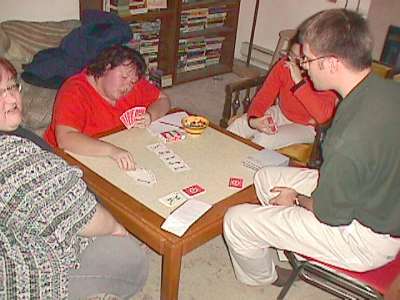
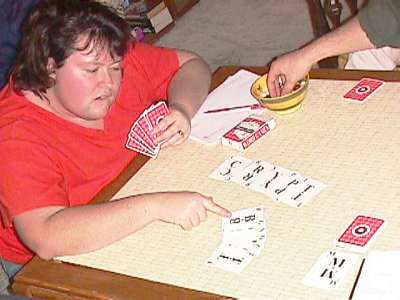
There was a break in the NewWord action while all four players dashed off around 9:15 to pick up Lesley Hooker. They returned around 9:45, and final scores for the game were as follows:
Meredith ... 467 Marty ...... 454 Paul ....... 420 Kam ........ 246
The game ended around 11:00. Mer swept the table with 467 points, and won a package of Wikki Stix (see photo of Mark above), then all four Alpha players, plus Lesley, went next door to Meredith's apartment to watch Kam's anime Nausicaä of the Valley of Wind. Kam would have won the Good Sport Award for the evening if we had one; although she is a completely fluent English-speaker, her native language is Cantonese, so she is at a disadvantage when playing an English word game like NewWord.
By this point, the only players left at Table 1 were me, Tim, Mark, and Chad. Since the next article I am writing in my series for The Games Journal is about card game systems, I persuaded the other three guys to give Zoki a spin.
"Spin" is the word. Zoki is a ridiculously overhyped card game system. When I related the ludicrous hyperbole on the Zoki site to the other players, such as that Zoki is a "Universal Game [that] will provide Entertainment for an Eternity," whereas "there are probably no more than thirty games that can be played with standard playing cards with variations", hoots of mockery circled round the table. After that, it was hard to get anyone interested in the system. When I explained that the Zoki game Red Alexa resembled Hearts, Mark said, "Why play Red Alexa? What's wrong with Hearts?"
Nevertheless, we eventually settled on a dominoes-like game called Dominator around 10:15.
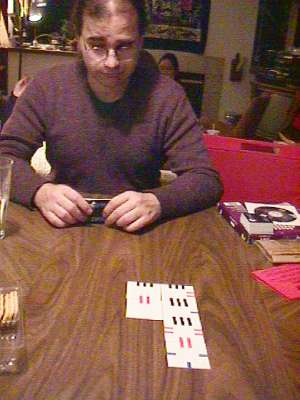
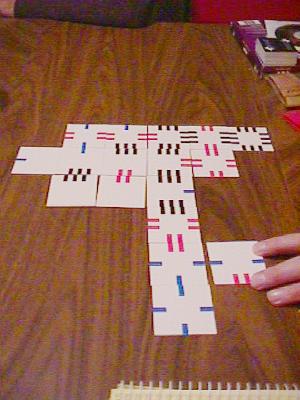
Players place Zoki cards on the table such that edges match, as in the photos above. If the number of stripes around the edge of the Zoki board is a multiple of five after you play your card, you receive that number of points. For example, if there are 25 stripes around the edge of the board after you play a card, you receive 25 points. You also get bonus points if you can match more than one edge.
As Chad remarked, "Zoki's based on the premise that counting is fun." Counting and recounting the number of stripes around the edge of the board became tedious pretty fast, so the scorekeeper (Mark) kept a tally and we figured out how to simply add and subtract stripes with each card we laid.
Tim Schutz proved quite good at the game, however, and had nearly half again as many points as his nearest competitor, Mark:
Tim ..... 155 Mark .... 115 Ron ..... 95 Chad .... 45
To be honest, though, we all found the scoring a little bizarre. Why should it be so much easier to get points late in the game, when there are so many stripes around the edges, while it is not any harder to make a multiple of five? And why (this is really bizarre) does the following player score 10 bonus points if you can't play a card? This makes sense in a two-player game, wherein you can "lock out" your opponent and reap 10 points yourself on your next turn, but no sense at all when there are more than two players. I said, "Zoki seems to have been invented by someone who had never actually played a game, but had heard that 'games' were 'fun' from his friends."
Anyway, Tim Schutz enjoyed it. He won a glow-in-the-dark skull. Maybe he understood something the rest of us didn't.
Next up at Table 1 was a filler, Give Me the Brain!, from Cheapass Games. I consider this one of the great Cheapass Games, right up there with The Very Clever Pipe Game, and I usually do well at it. The first ten games or so I played with friends and family (back before Seattle Cosmic existed), I was undefeated; people can beat me now, but I won this session.
As if to emphasise the fact that one gamer's peach is another gamer's frog (hey, some people even like frogs), Mark said this playing convinced him even further that he doesn't like the game. He stopped short of saying the game was jinxed for him, but did say he never seemed to draw the right cards when he played. Personally, I think part of it may be that GMTB! emphasises craftiness and moment-by-moment tactics, which I tend to call "wheedling" (something I do well), and that Mark is more of a long-term strategic thinker. Given the choice, I would wish to have Mark's strategic ability, but we must play the hand we're dealt (although, as in Poker, we can sometimes improve it).
These thoughts have been shaped by a terrific article from Sumo called "Chaos Gaming". IMHO: Mark is an Ordered Gamer. I am a Chaos Gamer. Marty is an Experience Gamer. Read the article.
Mark left around 11:15, so that left Chad, Tim, and me. Chad taught me the game of Zértz, while Tim looked on.
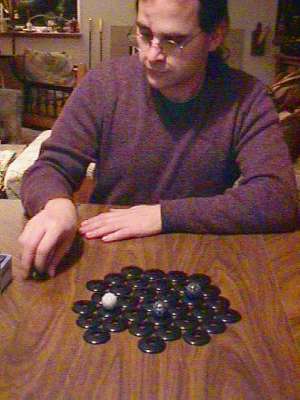
This is a quick little abstract game that can be both learned and played in a few minutes, yet seems fairly deep. Much of the strategy seems to involve forcing your opponent to force you to make multiple jumps and capture the right numbers of the right kinds of marbles. One of the attractive things about the game is that the board shrinks by one space every turn, so that in the endgame, which arrives quickly, even a strategic Dummkopf such as I can see what's going on.
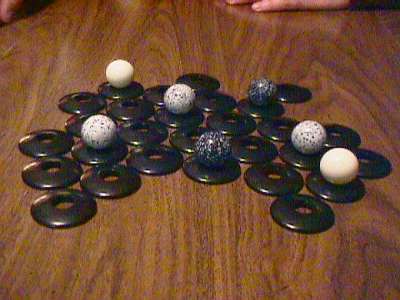
Yes, Chad won. Tim then left around 11:30, and Chad and I hung out, leafed through back issues of gaming mags WGR and Abstract Games Magazine, theorised about games, and discussed the possibilities for a gaming project I may yet announce in these pages. Then Chad went home around 12:05, borrowing Carcassonne, which was graciously donated to the Seattle Cosmic game library by Tim Higgins, and I went next door to watch the end of Nausicaä of the Valley of Wind with the erstwhile members of Table 2.
The Center for Ludic Synergy and Seattle Cosmic Game Night are now associates of Funagain Games. This means that 5% of your purchase there goes toward supporting us if you buy games there via the following links or the Funagain logo at the bottom of the page.
Even if you don't want to buy the games, the Funagain pages often contain lengthy, useful game reviews.
Friday, 7 December 2001, 7:00 PM in West Seattle. Come play for fun and FABULOUS PRIZES!
Remember, Seattle Cosmic Game Night occurs every weekend, in one of three locations: West Seattle, Mill Creek, or Kent. Email Ron Hale-Evans for a full schedule. If you come, please bring a snack or drink to share (cookies, chips, soda, juice, etc.).

Seattle Cosmic Game Night Home | Center for Ludic Synergy home
All photos on this page copyright © 2001 by Ron Hale-Evans except where otherwise noted.
Maintainer: Ron Hale-Evans, rwhe@ludism.org
Page last updated 2001-12-08.